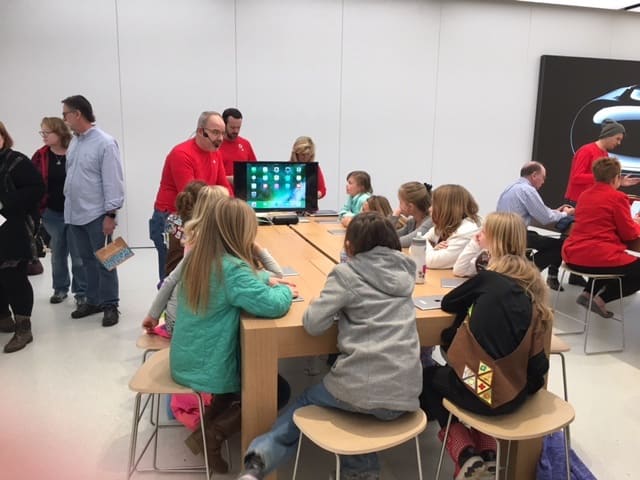Apple is Looking More and More Like the Company to Go With
The theme of this week’s Particle Debris is that technology advances are happening so fast that they are outstripping the ability of even reasonably informed people to make informed choices.
I’ll get to that, in some detail, further along.

We trust our kids are in good hands with Apple.
But first, one of the key elements of Apple’s proactive system design has been the way iOS updates are handled on our iPhones and iPads. This is important because we’ve reached an interesting security inflection point. Instead of continuing updates making our devices more and more secure, instead, continuing updates merely hold the fort until the next round of updates.
Whether by awesome prescience or good policy, Apple anticipated the above scenario by seizing control of the iPhone update process. Jonny Evans at Computerworld nicely explains the process that started in 2007.
Apple planned for this when it began to use subscription accounting in April 2007.
Author Evans reminds us that system updates weren’t always free.
It’s important to note that operating system upgrades were not always free.
You had to pay for both Mac and Windows upgrades. Windows Mobile (at that time a threat) demanded a fee for its upgrades, but customers weren’t buying. Palm, RIM, and Nokia only seldom introduced OS upgrades, preferring a ‘built-in-obsolescence’ model in which customers were driven to purchase new handsets to get hold of a new OS.
Of course, customers neglected to do that.
Today, 95 percent of iOS devices are running iOS 10 or later. Evans explains, “This means 95 percent of all actively used iOS devices run an operating system that’s under 2 years old. No other platform has this.”
This turns out to be critical when it comes to securing the iOS platform against ongoing threats.
Diametric Views, Apple and Facebook
Moving from platform security to user privacy, Cult of Mac lays out the great contrast between Apple and Facebook.
Facebook lost more value today than any other company in history: US$120 billion. The massive selloff came after CEO Mark Zuckerberg admitted that the growing privacy concerns of the public, and the likely response of lawmakers and regulators, will hit the company where it hurts: in the pocketbook.
Author Hardy lays out the stark contrast between the two companies and explores the continuing stress Facebook is under as users and the federal government acquire a new appreciation for how Facebook operates.
Facebook’s whole business model is gathering private data about users and selling it to advertisers. The people who use its social network aren’t the customers, they’re the product being sold.
But the company’s CEO just admitted that this is becoming increasingly difficult. Speaking to investors late yesterday, Zuckerberg warned ‘Looking ahead, we will continue to invest heavily in security and privacy because we have a responsibility to keep people safe. But as I’ve said on past calls, we’re investing so much in security that it will significantly impact our profitability.’
It’s bizarre how a statement that rings so hollow could spook investors. But we live in weird times.
Finally, one can reasonably conceive of the failure of Facebook if its growth stalls any more deeply and government scrutiny becomes more and more invasive and disruptive. Meanwhile, Apple continues to adhere to good principles of security and privacy. In a day and age when time to reflect on and manage our internet life is at a premium, it makes more and more sense to stick with a company whose values echo our own.
Next Page: The News Debris for the week of July 23rd. Advances that will leave your head spinning.
Page 2 – News Debris For The Week of July 23rd
Advances that will leave your head spinning

Who knew Apple Pay would unleash a flood of new payment methods? Image credit: Apple
• Paying for stuff used to be easy. You’d open your wallet and pull out paper bills. Even credit card transactions seem simple now. Swipe, sign a slip of paper and leave. Nowadays, one almost has to be a tech wizard to figure out all the paymnet systems. See: “How Software Ate the Point of Sale.” The subtitle leads us in: Or, why paying for stuff is so complicated now.
For awhile, after Apple Pay was introduced, it seemed that buying things would be easier. I still smile when I place my Apple Watch next to the terminal and complete a payment. But our technology now is in such a state that myriads of new payment schemes keep cropping up, and each merchant wants its own.
The article concludes:
This is a crazy world that requires hundreds of thousands of small businesses to work through hundreds of vendors to reach thousands of banks. Every company is trying to extract some bits (of data, of money) from every single transaction, building fortunes out of pennies. That’s why Google Pay and Apple Pay didn’t take off like Facebook or Uber. There are just too many human hands reaching for pockets that need to get on board.
Where this will lead is anyone’s guess.
More Debris
• The U.S. Congress has taken a more or less light touch approach to regulating most aspects of privacy and security. That extends to facial recognition, now rampant in China. So the ACLU did an interesting experiment, and the results got the attention of Congress. The headline tells the story. “Congressmen demand answers after Amazon facial recognition matches them to mugshots.”
Oops.
Related
• How do you understand the mind of an AI and its decision making processes? Why, unleash another AI on it, of course. “Artificial intelligence has learned to probe the minds of other computers.” The opening paragraph sums up this research beautifully.
Anyone who’s had a frustrating interaction with Siri or Alexa knows that digital assistants just don’t get humans. What they need is what psychologists call theory of mind, an awareness of others’ beliefs and desires. Now, computer scientists have created an artificial intelligence (AI) that can probe the ‘minds’ of other computers and predict their actions, the first step to fluid collaboration among machines—and between machines and people.
This gets to the core of why we often feel so frustrated by Siri. Siri has no way of intuiting what we’re really after in our requests. It struggles just to parse our speech. This research could lead to a better understanding of humans by computers. It’ll feel creepy at first, but that’s where we’re headed.

Hey Siri. If you can’t understand me, maybe a companion AI can help.
• The Canadian Medical Association Journal suggests that “Doctors need retraining to keep up with technological change.” (One might think that physicians are very well acquainted with computer technology, but that’s often not the case.) The article opens with its assessment.
‘While it’s hard to predict the future, we know artificial intelligence, digital medicine and genomics will have an enormous impact on improving efficiency and precision in health care,’ says Dr. Eric Topol, executive vice-president of the Scripps Research Institute, in an interim report called ‘Preparing the health care workforce to deliver the digital future.’ These changes will also transform what it means to be a clinician…
As an example of technology racing forward and the need for doctors to better understand their tools, I ran across this: “IBM’s Watson reportedly created unsafe cancer treatment plans.” It’s not that Watson is a general failure. In fact, Watson has been very good with medical diagnostic assistance. The issue is the ability of highly trained humans to partner with Watson and use human judgment to make up for Watson’s occasional failings. And, by implication, the patients need to be well-informed as well.
Otherwise, we end up blindly taking the machine’s advice in every case. This means that doctors will need to know a lot more about AI in the future so that we have good interactions with both them and, in the long run, devices that monitor our health. Like the Apple Watch.
• Finally, speaking of the Apple Watch, Dan Moren has some great thoughts on where Apple should and might take the Apple Watch Series 4. “Looking forward to the next Apple Watch.”
I had more mind spinning stories to share, but I’m out of room. Hopefully, the few items above will light up your brain for the week.
Particle Debris is a generally a mix of John Martellaro’s observations and opinions about a standout event or article of the week (preamble on page one) followed on page two by a discussion of articles that didn’t make the TMO headlines, the technical news debris. The column is published most every Friday except for holiday weeks.
0 Response to "Apple is Looking More and More Like the Company to Go With"
Post a Comment